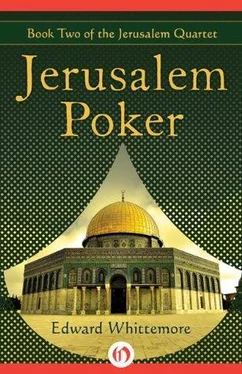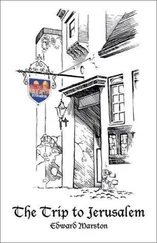Menelik Ziwar had cackled lightly.
The poor man's deluded idealism at work, you see. And although it seems witless today, that Hyksos gang with their dense shepherd heads believed him. They had another round of beer and that very night followed the tavern owner out to the Great Pyramid with all their tools.
The first thing he had them do was hollow out a base camp, or in this case a top camp, where they could live in secret while sinking their shafts. Then they dug tunnels down toward the bottom, all the way down to the bedrock beneath the pyramid. But they missed the burial chambers and instead broke through into a subterranean stream.
Bad luck for the Hyksos gang, good luck for us. The Nile was flooding and if it hadn't been, who knows?
They might have gone on digging vertical tunnels until the pyramid had become structurally unsound and collapsed.
Menelik Ziwar had smiled.
The Great Pyramid suddenly collapsing in on itself? Simply deflating like a balloon? Do you realize there are six and a half million tons of rock in there? Can you imagine the noise it would make?
He sighed.
Pollution saved us. Once again that paradox of the Nile. The Nile was flooding and sewerage from Memphis had infected the subterranean stream. Crazed by thirst after their long dusty dig down from the summit, the Hyksos gang and the tavern owner threw themselves into the sluggish stream to drink their fill and then some.
Ziwar had nodded thoughtfully.
A matter of minutes, I'd imagine. The dysentery endemic to subsurface Nilotic tributaries is particularly virulent. They had enough strength to crawl back up to their top camp, but not enough to budge the block of stone over the entrance when they got there. And that's where I found their skeletons, the bones of the Hyksos telling us nothing as usual, the tavern owner having spent his last moments, by now no longer an idealist, tracing the hieroglyph for beer in the dust.
Menelik Ziwar then briefly concluded his tale.
The top camp and vertical tunnels had remained lost until he deduced their existence in 1844 by studying the irregular air currents in the known shafts and chambers of the pyramid. Finding them was a simple matter once he knew they existed. He examined the large top camp and decided it would make an appropriate country retreat and eventual retirement home for the world's leading unknown Egyptologist.
Accordingly, he made plans to furnish it, sparing no expense.
The work had taken sixteen years. During that time Strongbow had often stayed in the unfinished flat when passing through Lower Egypt and had always greatly enjoyed it, as he wrote in a letter from Aden around the middle of the century.
My Dear Menelik,
The air at your future country retreat is simply incomparable. And among its many other attributes I would also have to mention the superior quality of the view, the serenity of the sunrises and sunsets as seen from the doorstep, and in general that pervasive sense of solitude men of our nature find so invigorating. Lastly there is the aura of tranquility that one cannot help but feel when going to bed in the summit of the greatest monument on earth.
Congratulations, my friend. An altogether admirable project. Many thanks for a lovely weekend in this superb perch you have found for your old age.
Yours etc, Plantagenet
P.S. I enclose a rare Solomon's-seal as a token of my appreciation. I came across it last month in the Hindu Kush and have never seen a lily-of-the-valley quite like it.
P.P.S. Are we still on for next Sunday?
Indeed, Menelik Ziwar was convinced he had found the perfect country home for himself. So much so he waited until every detail was completed before he went up to spend his first night in the flat.
He chose his forty-third birthday for the occasion, Christmas, 1860. He would have liked to have asked Strongbow to join him for the celebration, but the explorer was off somewhere in disguise and couldn't be reached.
Ziwar spent the day happily roaming through his new apartment. At the end of the afternoon he prepared a feast of roast beef and Yorkshire pudding accompanied by three wines and two vegetables, a baked potato and a savory, ending with a magnum of champagne and a large serving of his favorite greens, a weed common to the poorer sections of Alexandria where it grew wild in vacant lots, a nostalgic reminder of his youth when there had often been little else to eat.
After dinner Ziwar set up a canvas chair on the summit of the pyramid to watch the sunset while smoking a cigar.
A thoroughly successful day, or so it seemed. Drowsy from his meal and the wine, he retired early to the master bedroom and quickly fell asleep, only to find himself awake in terror a few minutes later, overcome by a sensation of falling, this sudden irrational fear of heights evidently brought on by a lifetime spent in confined subterranean spaces.
In any case, Ziwar knew he could never spend another night in his lofty flat. Sleeping that high in the air was out of the question. When the time came for him to retire, he decided, he would resort to the snug security of an underground sarcophagus, preferably that of Cheops' mother, rather than Cheops'
chamber in the sky.
Here Martyr moved with his albino monkey and his tins of meat on August 14, sleeping and reading and exploring the interior of the pyramid by day, sitting on top of the pyramid devising his plans by night, oblivious to the monstrous new war in Europe where massed armies were savagely destroying each other in muddy trenches.
And there in the clear dry air of that ancient pinnacle above the Nile, methodically and relentlessly, Cairo Martyr pondered the injustices suffered by Africans over the centuries, historical crimes he intended to repay in full measure.
Considering where he was living, it wasn't surprising he decided to deal with the pyramids first. Slave labor had built them for pharaohs who thought they were gods, but a pharaonic god was nothing without his mummy and Martyr owned the largest cache of pharaonic mummies in the world.
About the time of the first battle of the Marne, he moved all his mummies in sealed cases to the top of the pyramid. There, in Ziwar's workshop for archeological restoration, he proceeded to grind them down into a fine powder.
So much for the eternal gods of ancient Egypt. He had reduced them to dust but that wasn't enough.
After prolonged meditation, coincidental with the second battle of Ypres, he decided to desecrate the once holy remains of the pharaohs as well.
During the Somme offensive he converted Ziwar's workshop into a pharmacy and carefully mixed half of his mummy powder with mastic gum, producing a balm he intended to sell as an aphrodisiac with general magical properties. Thus the tyrannical builders of the pyramids would end ignominiously with a pinch of their dust lodged in the nostrils of wheezing old men greedy for longer life, another pinch served up as mastic to be smeared on the unwashed pudenda of barren women, a third encrusting the slack sexual organs of nervous merchants unable to obtain an erection.
The formerly glorious pharaohs sordidly sold as mummy dust and mummy mastic in back alleys.
Available to any corrupt illiterate who could pay for them, just as African slaves had once been.
Martyr now moved forward from ancient to modern Egyptian tyrants. The Mamelukes, as pederasts, had simply disappeared from history. But the Arabs had been their coreligionists in the slave trade and it was therefore through Islam that he would strike. Since he was nominally a Moslem he had access to all the holy places.
A desecration here too then? Some intolerable act that would outrage the entire religion?
Cairo Martyr smiled. He lit a cigarette. The second battle of the Marne had just ended and the Great War would soon be over. And so too the night. Dawn was coming and he was sitting on top of the pyramid, contemplating the last minutes of darkness, when the revelation came to him. Significantly, he was facing east.
Читать дальше












